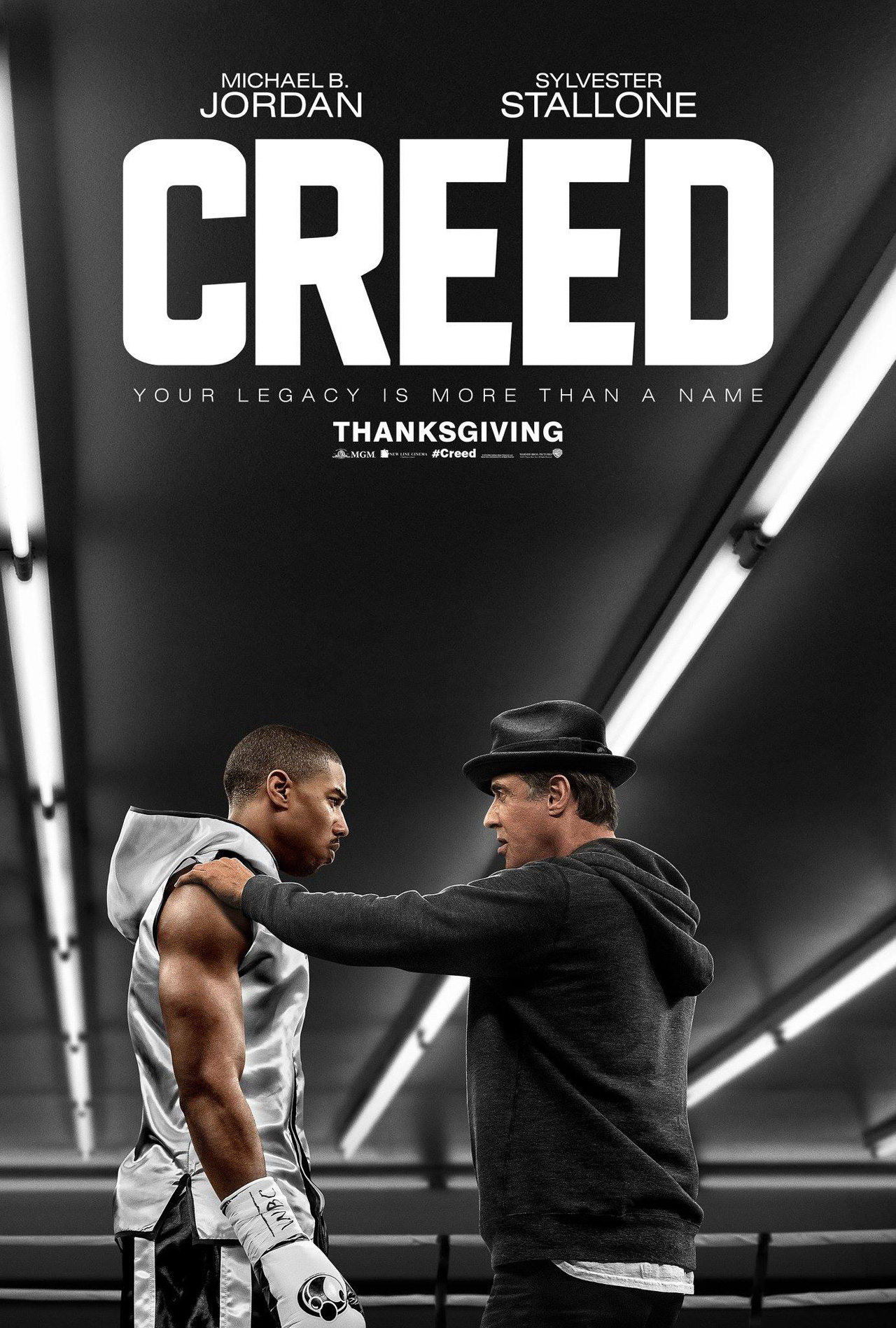
Nordling here.
When we first meet Adonis Johnson (Alex Henderson as a child, and Michael B. Jordan as an adult) in 1998, he’s serving time in juvenile detention. He is coiled rage, ready to strike, fists gripped tight. No one can get through to him – at least, until Mary Anne Creed (Phylicia Rashad) comes into his cell and drops a bit of familial truth on him. Adonis’s fists slowly unclench, and his eyes grow wide. “What was his name?” he asks, and we smash cut to the title. At that point, Ryan Coogler’s CREED owned my soul.
Coogler, along with screenwriter Aaron Covington (based on Coogler’s story), have tapped into everything that makes the ROCKY Saga great, but have also added their own voices and skills to the mix. CREED respects and honors the films before it, but also stands on its own merits. I’m surprised no one has come up with the idea of Apollo Creed’s son being trained by Rocky Balboa to fight the heavyweight champion before – it reads like a marketing dream. But it would simply be another stale sequel had not Coogler, Michael B. Jordan, and Sylvester Stallone filled it with such heart and power. This is more than a passing of a torch – this is breathing new life, new meaning, into a story that felt concluded, and in doing so, has given us a hero for a new generation of fans. This power, this willingness to change with the times but still remain true to its core values, is why this franchise endures.
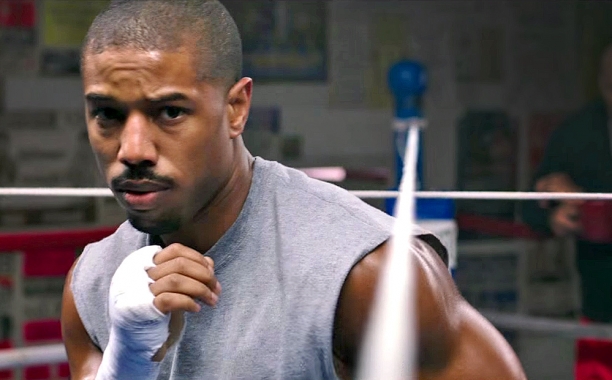
It also announces Ryan Coogler as a major talent in cinema. His FRUITVALE STATION was a great first film, but CREED is a leap forward in quality and skill. His direction is superb, getting terrific performances from his cast, but he also has an ear for great dialogue, and a true cinematic eye. It must be difficult to write for such an established character as Rocky Balboa, but Coogler knows Balboa as intimately as anyone. Add to that Stallone’s career-best work as Rocky, as well as Michael B. Jordan’s firecracker of a performance as Adonis, and Coogler’s willingness to stay grounded, and you have a film that can safely be compared to the first ROCKY in power and magnitude. In fact, CREED is the best ROCKY movie since, well, ROCKY.
Look, I could go into a lengthy discussion of how much the ROCKY movies have meant to me. This is a franchise that has always been better than it has been given credit for, even when it dipped into the ridiculous. There’s only one truly bad movie in the series (although I’m not the biggest fan of ROCKY IV, THE MONTAGE). I’ve seen every one of them in the theater, most of them with my own dad. Sylvester Stallone’s marble-mouthed, decent but brutal, kind but formidable Italian Stallion has to be regarded as not only his most famous character, but also as Stallone’s best work as an actor. These films are rich with feeling, silly a lot of the time, even achingly romantic. ROCKY is probably the finest love story of the 1970s (and that includes LOVE STORY). The emotions may be broad and overt, but that doesn’t make them any less true or relatable. I don’t care who you are – if you grew up watching Stallone’s “I can’t beat him” testimonial to Adrian, you felt it. Believed it. Took it to heart. Made it a creed, for lack of a better term, in your life. The films in the franchise bobbed and weaved through earnestness straight through to superhero silliness and back again, but the basic truth of the ROCKY movies remained – we are here, and we are important, and no one is going to knock us down, especially ourselves.
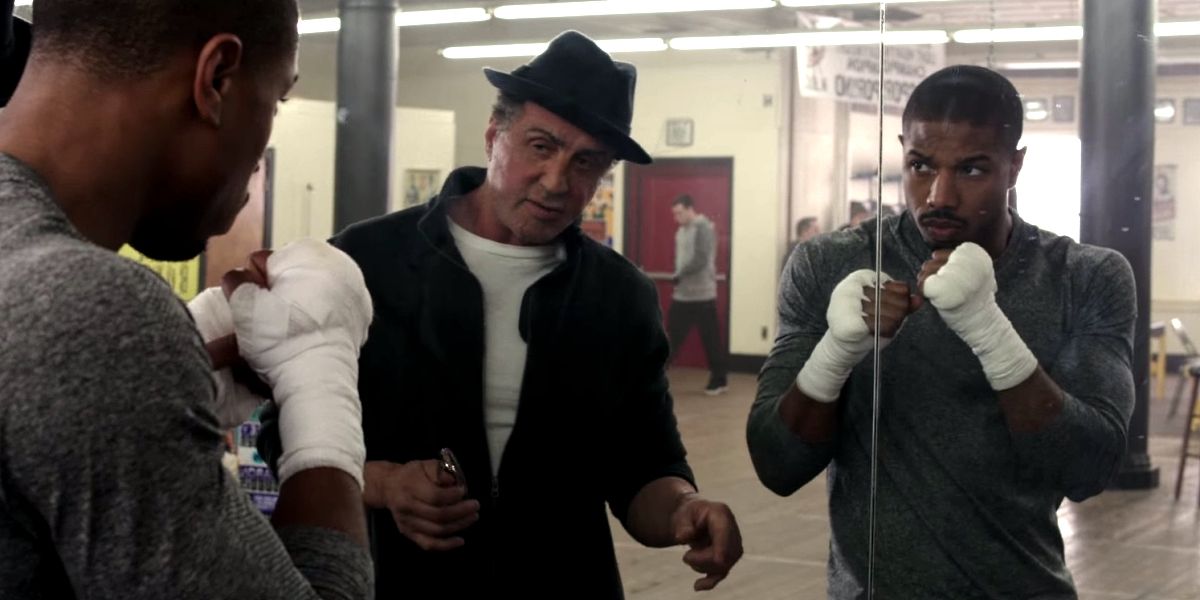
Adonis Johnson knows this intimately – although he lives a privileged life with his adopted mother, working a white-collar job and living off of Apollo Creed’s (Carl Weathers) fighting money, there is a fury to him. Adonis is angry at his father, who he never knew, and who had an affair with his mother before dying in the ring. When no one’s looking, Adonis goes to Mexico to fight in exhibition matches, and his self-taught boxing ability has given him some success, but when he goes up against expertly trained fighters, Adonis falls short. Shadowboxing against his father on a projected YouTube video of Rocky and Apollo’s second fight, Adonis wants desperately to be a successful boxer, but on his own terms, not his father’s. Adonis cannot forgive, and he cannot forget.
Adonis decides that there’s only one person in the world that can take him seriously, so he moves to Philadelphia to find him – Rocky Balboa, still managing Adrian’s Restaurant, living alone since Paulie’s passing a few years before. Rocky is reluctant to train Adonis, even after Adonis reveals his parentage. But Rocky recognizes that hunger in Donny, and takes it upon himself to train him. Adonis also forms a relationship with his neighbor Bianca (Tessa Thompson) that grows into something more. But all the while, Adonis is running from who he is, still full of anger and fury, refusing to come to grips with his past. Even as his skills as a boxer progress, he cannot make peace with it. And suddenly tragedy strikes Rocky, just when Adonis needs him the most.
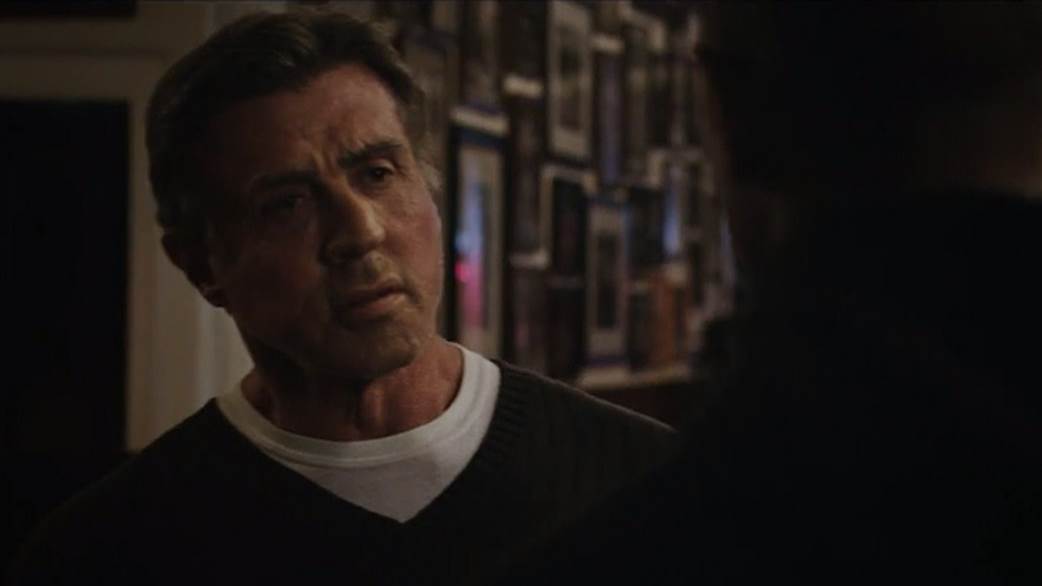
Michael B. Jordan embodies the son of Creed, and fills him with passion and love. Adonis is desperate to connect with anyone, looking for fathers everywhere, and Jordan makes that need palpable. His relationship with Rocky is always effective and riveting, and Jordan and Stallone have a wonderful chemistry together. But when Adonis feels the pain of loss, Jordan brings all that anger and hurt to his eyes. It’s a powerhouse performance, and the other actors around him are boosted by it. Tessa Thompson’s Bianca brings stability and love into Adonis’s life, and Thompson gives Bianca compassion while being fiercely independent and strong. The supporting cast does good work as well, including Graham McTavish as the manager to Tony Ballew’s Ricky Conlan, the heavyweight champ with his own personal issues to overcome.
Rocky may be on the outside of the ring this time, but his story is no less compelling. I’ve never been a fan of the idea of “legacy Oscars,” rewarding an actor for their years of work instead of one particularly great performance, but I would have absolutely no problem with an awards campaign for Sylvester Stallone here. It wouldn’t be just a legacy, either. Stallone has never been better, in any role, than he is here, and I’m including the first ROCKY film in that assessment. Sly has lived inside this character for almost 40 years – he knows this character inside and out, and even with CREED he still has the capacity to surprise us. Rocky is more subdued, sadder, but still fighting, still moving forward. Stallone gives Rocky a vulnerability than we haven’t seen to this degree before – all his family and friends are gone, including his son Rocky Jr. who has moved to Vancouver (there’s a bittersweet, mournful moment with Stallone’s real life son in a photograph, and it’s difficult to separate the scene from the tragedy of his loss). Rocky is as lonely as Adonis is, and to quote the first film, “together we fill gaps.” Their friendship and love for each other feels genuine, and the moments Jordan and Stallone share the screen are a joy to experience. Rocky is a good, kind man, but Stallone never makes those personality traits of Rocky dull or maudlin. He still demonstrates the same power in his work here that made his fans adore him as they do. Stallone deserves all the accolades that will hopefully come his way this awards season.
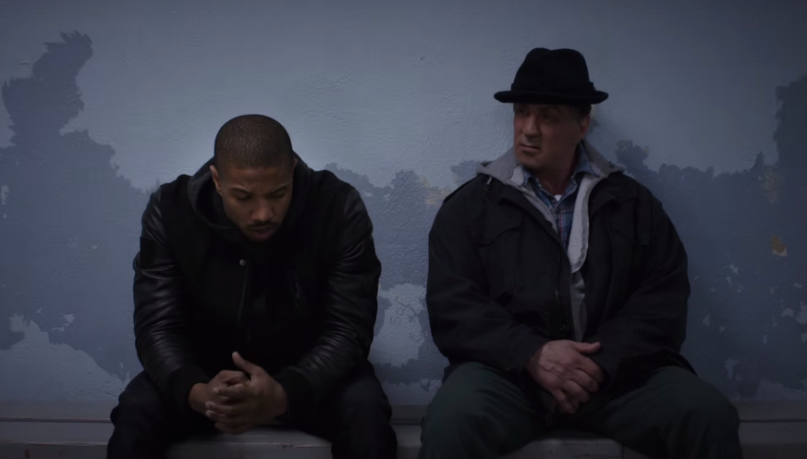
This may be the best looking film in this franchise yet – cinematographer Maryse Alberti shoots the fights with an intensity that matches the subject. We follow Adonis in the ring, sometimes right over his shoulder, and each punch that lands feels like it punches straight to the face of the audience. One fight is shot in a continuous unedited take, but it’s not a gimmick; as the match goes on, the excitement builds, and Alberti puts us inside the fight like none of the other ROCKY films have before, not like this. She’s helped tremendously by Ludwig Göransson’s fantastic score, which manages to weave Bill Conti’s classic themes into something newer, vital, and all its own. I love how Rocky’s theme is more subdued, less urgent, while Adonis’s theme comes pounding in with fury and thunder. But when that great Conti theme we all know and love comes in, it is an audience moment for the ages, and I defy anyone not to go into rapturous applause during it. There are a lot of moments like that in CREED – it is a true audience experience, as rousing as the grandest moments in the ROCKY Saga.
But it’s no longer just the ROCKY Saga, is it? It’s more. Rooted in the past, but with eyes on the future, CREED promises more stories in this world, and I’m eager as hell to start experiencing them. Sylvester Stallone has done a brave thing here – he’s letting other artists frolic in his playground, and these films are all the better for it, because everything we love about the ROCKY Saga can go on for generations to come. I want this series to last as long as these filmmakers are willing to make these movies. Ryan Coogler does something exemplary. CREED is a movie about the search for those bonds of family – if we can’t find them in our own family, Coogler suggests, then find that love somewhere, because we are not whole without it. There is love in every single frame of CREED, a love that you get to take with you when you leave. This film is alive, breathing, and essential, a triumphant ringing of the bell, and one of the most joyous experiences I've had in a movie this year.
Nordling, out.
